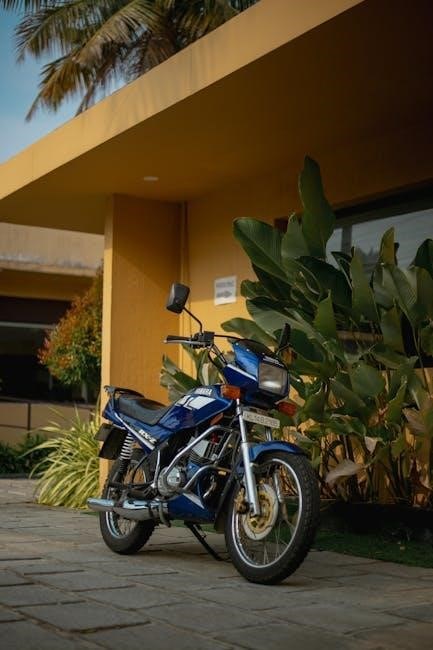The Massachusetts Motorcycle Manual is a comprehensive guide for riders, offering essential information on road safety, defensive driving, and state-specific laws. Available in PDF, audio, and multiple languages, it helps riders prepare for the permit test and stay informed about local regulations. Published by the RMV, this manual is a vital resource for both new and experienced motorcyclists, ensuring they can navigate Massachusetts roads safely and responsibly.
1.1 Overview of the Manual
The Massachusetts Motorcycle Manual is a detailed guide designed to prepare riders for safe and responsible motorcycling. Available in PDF, audio, and multiple languages, it covers essential topics such as road signs, safe riding practices, and state-specific laws. The manual is tailored for both new and experienced riders, ensuring a comprehensive understanding of motorcycle operation. It also includes information on defensive driving, lane splitting dangers, and helmet requirements. The 2025 edition emphasizes updated regulations and study resources, such as practice tests, to help riders succeed in obtaining their Class M license and staying safe on Massachusetts roads.
1.2 Importance of the Manual for Riders
The Massachusetts Motorcycle Manual is crucial for riders as it provides the knowledge needed to operate a motorcycle safely and legally. It covers essential topics like road safety, defensive driving, and state-specific laws, ensuring riders are well-prepared for the road. By studying the manual, riders can reduce accidents, understand traffic laws, and develop safe habits. It also serves as a key resource for obtaining a Class M license, offering practice tests and guides. The manual’s updated 2025 edition includes new regulations and resources, making it indispensable for both new and experienced riders aiming to stay safe and compliant in Massachusetts.

Structure of the Massachusetts Motorcycle Manual
The Massachusetts Motorcycle Manual is structured to cover essential topics for riders, including road safety, defensive driving, and state-specific regulations. It is divided into clear sections, making it easy to navigate and study. The manual also includes practice tests, guides, and resources to help riders prepare for exams and stay informed about local laws and safe riding practices. Available in multiple languages and formats, including audio, it ensures accessibility for all riders, providing a comprehensive guide to safe and legal motorcycle operation in Massachusetts.
2.1 Sections Covered in the Manual
The Massachusetts Motorcycle Manual is divided into key sections to ensure comprehensive coverage of essential topics. It includes detailed information on road safety, defensive driving techniques, and Massachusetts-specific motorcycle laws. The manual also covers licensing requirements, RMV procedures, and insurance mandates. Additionally, it provides insights into motorcycle training programs, public awareness campaigns, and study resources for riders. Each section is designed to address specific aspects of motorcycle operation, ensuring riders are well-prepared for both the written and practical exams. The manual also highlights updates to laws and regulations, making it a complete guide for safe and legal motorcycle riding in Massachusetts.
2.2 Key Topics for Safe Riding
The Massachusetts Motorcycle Manual emphasizes critical topics for safe riding, focusing on defensive driving strategies and hazard identification. Riders learn how to manage speed, maintain safe following distances, and navigate challenging road conditions. The manual also covers pre-ride checks, ensuring motorcycles are roadworthy. It highlights the importance of staying alert, anticipating potential dangers, and using proper braking techniques. Additionally, it addresses strategies for handling emergencies, such as skidding or sudden obstacles. These topics are essential for building confident and responsible riders, helping them minimize risks and stay safe on Massachusetts roads.

Preparing for the Massachusetts Motorcycle Permit Test
Preparing for the Massachusetts Motorcycle Permit Test involves understanding traffic laws, safe riding practices, and the manual’s guidelines. Continuous learning ensures better test readiness and safer riding habits.
3.1 Eligibility Requirements
To apply for a Massachusetts motorcycle permit, you must meet specific eligibility criteria. Riders under 18 need parental consent, and all applicants must pass a vision test. A medical evaluation may be required if certain health conditions exist. Additionally, completing a motorcycle safety course is mandatory for riders under 21. Applicants must also pass a written knowledge test on traffic laws and motorcycle-specific content. Visit the RMV with proper identification and documentation to complete the application process. These requirements ensure riders are prepared and qualified to operate a motorcycle safely on Massachusetts roads.
3.2 Study Materials and Resources
The Massachusetts Motorcycle Manual is the primary resource for preparing for the permit test. It covers essential topics like road signs, traffic laws, and motorcycle-specific safety tips. Additional study materials include online practice tests available on the RMV website, which simulate the actual exam format. Riders can also benefit from motorcycle safety courses offered by organizations like the Massachusetts Rider Education Program (MREP). These courses provide hands-on training and in-depth knowledge of safe riding practices. Utilizing these resources ensures applicants are well-prepared for both the written test and the practical skills required for safe motorcycle operation.
3.3 Practice Tests and Study Guides
Practice tests and study guides are invaluable tools for mastering the Massachusetts Motorcycle Manual. The RMV offers official practice tests online, mirroring the actual exam format and content. These tests cover essential topics like road signs, traffic laws, and motorcycle-specific safety rules. Additionally, third-party websites provide practice tests and interactive study guides to reinforce learning. Many guides include flashcards, quizzes, and video tutorials to cater to different learning styles. Regularly taking practice tests helps identify weak areas, allowing riders to focus their study efforts effectively. This structured approach ensures a comprehensive understanding of the material before taking the actual permit test.

Road Safety and Defensive Driving
Mastering road safety and defensive driving techniques is critical for motorcyclists. Strategies include maintaining visibility, positioning in lanes, anticipating hazards, and adjusting speed for conditions.
4.1 Defensive Driving Tactics
Defensive driving tactics are essential for motorcyclists to minimize risks on the road. These strategies involve anticipating potential hazards, maintaining situational awareness, and reacting proactively to unsafe situations. Key tactics include:
- Maintaining a safe following distance to allow time to react.
- Being aware of blind spots and continuously scanning the road.
- Using effective braking techniques, such as gradual deceleration.
- Positioning the motorcycle in lanes where visibility is optimal.
- Signaling intentions clearly and consistently to other drivers.
By mastering these defensive driving tactics, motorcyclists can significantly reduce the likelihood of accidents and enhance their safety on the road.
4.2 Developing Safe Driving Habits
Developing safe driving habits is crucial for motorcyclists to reduce risks and ensure a safe riding experience. Consistent practice of these habits helps riders anticipate and respond to hazards effectively. Key habits include:
- Always wearing protective gear, such as helmets, gloves, and durable clothing.
- Conducting pre-ride inspections of the motorcycle to ensure proper function.
- Staying alert and focused, avoiding distractions like using a phone.
- Following traffic laws, including speed limits and right-of-way rules.
- Positioning the motorcycle to increase visibility to other drivers.
By consistently practicing these safe driving habits, motorcyclists can significantly enhance their safety on Massachusetts roads.
Massachusetts Motorcycle Laws and Regulations
Massachusetts motorcycle laws and regulations are designed to ensure safe riding practices, legal compliance, and protection for motorcyclists, promoting harmony with other road users;
5.1 Lane Splitting and Its Dangers
Lane splitting, the practice of riding between two lanes of traffic, is illegal in Massachusetts. This dangerous maneuver increases the risk of accidents, as motorcyclists are more vulnerable in tight spaces. Sudden stops or unexpected vehicle movements can lead to collisions. Additionally, lane splitting reduces visibility for both motorcyclists and other drivers, further heightening risks. Massachusetts law strictly prohibits this practice to protect riders and maintain road safety. Motorcyclists are advised to stay within designated lanes and follow traffic flow to minimize hazards and avoid legal penalties.
5.2 Helmet and Safety Gear Requirements
In Massachusetts, all motorcyclists and passengers are required to wear a helmet that meets U.S. Department of Transportation (DOT) or Snell Memorial Foundation standards. Helmets must have a visor or riders must wear protective eyewear. Additionally, wearing sturdy gloves, boots, and protective clothing is highly recommended to reduce injury risks. The law mandates these safety measures to protect riders in the event of an accident. Failure to comply with helmet and safety gear requirements can result in fines and legal penalties. Adhering to these rules is essential for rider safety and legal compliance on Massachusetts roads.
Motorcycle Licensing in Massachusetts
Motorcycle licensing in Massachusetts requires a Class M license, involving vision, written, and road tests. Riders under 18 must hold a learner’s permit for one year. The RMV manages the process, ensuring adherence to state laws for safe motorcycle operation.
6.1 Class M License Overview
A Class M license is required to legally operate a motorcycle in Massachusetts. It is specifically designed for motorcycles and other two-wheeled vehicles. To qualify, applicants must be at least 16 years old, with drivers under 18 required to complete a Motorcycle Safety Foundation course. The Class M license is separate from a standard driver’s license and involves a vision test, written exam, and road test. Riders under 18 must hold a learner’s permit for one year before applying. The license ensures riders meet state safety and skill standards, promoting responsible and safe motorcycle operation on Massachusetts roads.
6.2 Steps to Obtain a Motorcycle License
To obtain a motorcycle license in Massachusetts, applicants must follow specific steps. First, they must meet the eligibility requirements, including age and residency. Next, they should study the Massachusetts Motorcycle Manual to prepare for the written test. Applicants must then visit an RMV office to complete a vision test and take the motorcycle knowledge exam. Upon passing, they receive a learner’s permit, which allows them to practice riding under certain restrictions. After holding the permit for the required period, they can schedule a road test to demonstrate riding skills. Upon passing, they are issued a Class M motorcycle license;

The Role of the Massachusetts RMV
The Massachusetts RMV oversees motorcycle licensing, registration, and safety programs. It provides resources like the motorcycle manual and manages testing for rider certification while promoting road safety.
7.1 RMV Resources for Motorcycle Riders
The Massachusetts RMV provides essential resources for motorcycle riders, including the official Motorcycle Manual, which covers safety tips, traffic laws, and licensing requirements. Riders can access practice tests online to prepare for the permit exam. The RMV also offers guides on road safety and defensive driving techniques. Additionally, the RMV website provides detailed information on motorcycle registration and insurance requirements. These resources help riders understand Massachusetts-specific rules and ensure they are well-prepared for safe and legal riding. The RMV also updates its materials regularly to reflect changes in laws and safety guidelines, making it a reliable source for motorcycle enthusiasts.
7.2 RMV Motorcycle Manual Availability
The Massachusetts RMV Motorcycle Manual is widely available to ensure easy access for all riders. The manual can be downloaded for free from the official RMV website in a digital format, allowing riders to study at their convenience. Physical copies are also available at local RMV branches across the state. Additionally, many community centers and libraries carry copies of the manual. Riders can also request a mailed copy by contacting the RMV directly. This accessibility ensures that everyone can obtain the necessary information to prepare for the motorcycle permit test and stay informed about Massachusetts motorcycle laws and safety guidelines.

Motorcycle Insurance in Massachusetts
Motorcycle insurance in Massachusetts offers various coverage options, including liability, collision, and comprehensive policies, ensuring financial protection for riders in case of accidents or damages.
8.1 Insurance Requirements for Riders
In Massachusetts, motorcycle riders must meet specific insurance requirements to legally operate their vehicles. Riders are required to carry liability insurance, which covers bodily injury and property damage to others in case of an accident. The minimum coverage amounts are $20,000 per person and $40,000 per accident for bodily injury, and $5,000 for property damage. Additional coverage options, such as collision and comprehensive insurance, are also available but not mandatory. Riders must carry proof of insurance and present it during traffic stops or accidents. Failure to maintain proper insurance coverage can result in fines, license suspension, or even vehicle impoundment.
8.2 Recent Insurance Rebates for Motorcycle Owners
Massachusetts motorcycle owners may be eligible for recent insurance rebates aimed at reducing costs while promoting safety. Some insurance providers offer rebates to riders who complete approved motorcycle safety courses, such as those offered by the Massachusetts Rider Education Program (MREP). Additionally, discounts may be available for owners who install anti-theft devices or opt for higher safety-rated motorcycles. The Massachusetts Department of Insurance has also introduced initiatives to make coverage more affordable for low-income riders. These rebates and discounts help mitigate the financial burden of insurance while encouraging responsible and safe riding practices across the state.

Motorcycle Rider Education and Training
Mandatory for new riders, Massachusetts offers training programs combining classroom and on-bike instruction, teaching safe riding techniques, traffic laws, and crash avoidance strategies to build confidence and skills.
9.1 Training Wheels Program Details
The Training Wheels Program is a state-sponsored initiative designed for new motorcycle riders. It combines classroom instruction with hands-on training, focusing on safety techniques, traffic laws, and hazard recognition. The program emphasizes reducing risks and improving riding skills. Participants learn control techniques, emergency maneuvers, and group riding strategies. The course is mandatory for riders under 18 and highly recommended for all new riders. It typically spans several days, covering both theoretical and practical aspects. Upon completion, riders receive a Certificate of Completion, which is required for obtaining a Class M license endorsement. This program is crucial for building a strong foundation in motorcycle safety.
9.2 Benefits of Completing a Motorcycle Safety Course
Completing a motorcycle safety course offers numerous benefits for riders. It significantly reduces the risk of accidents by teaching defensive driving techniques and hazard awareness. Riders gain enhanced skills in braking, cornering, and emergency maneuvers. Many insurance providers offer lower premiums for graduates, cutting costs. The course also boosts confidence, especially for new riders. In Massachusetts, completing a safety course may satisfy requirements for obtaining a motorcycle license endorsement. It provides a structured learning environment with expert instructors. Additionally, it fosters a culture of safety and responsible riding. Overall, the course is a valuable investment for riders of all experience levels.

Public Awareness and Safety Campaigns
Massachusetts conducts public awareness campaigns to promote road safety, focusing on sharing the road and reducing motorcycle accidents. These initiatives include social media, school programs, and community events to educate drivers and riders, fostering a culture of mutual respect and safety on the roads.
10.1 Efforts to Keep Massachusetts Roads Safe
Massachusetts actively promotes road safety through various initiatives, including “Share the Road” campaigns and “Look Twice, Save a Life” programs. These efforts aim to reduce motorcycle accidents by educating both drivers and riders. The state collaborates with local authorities, schools, and community groups to host safety workshops and distribute educational materials. Additionally, public awareness campaigns highlight the importance of defensive driving and the dangers of distracted driving. Massachusetts also encourages motorcyclists to wear protective gear and follow traffic laws. These collective efforts aim to create a safer environment for all road users and reduce fatalities.
10.2 Community Initiatives for Rider Safety
Community initiatives in Massachusetts play a vital role in promoting motorcycle safety. Local organizations often host safety workshops, bike nights, and awareness events. These events provide riders with tips on defensive driving, proper gear maintenance, and hazard avoidance. Some groups partner with law enforcement to conduct safety checks and offer riding tips. Additionally, community-led campaigns encourage riders to share their experiences and best practices. These grassroots efforts foster a culture of safety and camaraderie among motorcyclists, helping to reduce accidents and enhance overall road safety. By engaging riders directly, these initiatives ensure that safety remains a top priority in the community.

Additional Study Resources
Massachusetts offers various study resources, including online practice tests, mobile apps, and downloadable guides. These tools help riders prepare for the motorcycle permit test effectively.
11.1 Audio and Multi-Language Versions of the Manual
The Massachusetts Motorcycle Manual is available in audio format, enabling auditory learners to absorb information effortlessly. Additionally, multi-language versions, including Spanish, Portuguese, and others, ensure accessibility for non-English speakers. These resources are designed to accommodate diverse learning preferences and linguistic backgrounds, promoting inclusivity and safety. Riders can download these versions from the RMV website or access them through mobile apps. The audio version is particularly helpful for those who prefer hands-free learning or have visual impairments. This initiative underscores Massachusetts’ commitment to making motorcycle education accessible to all residents, fostering safer roads and empowering riders with comprehensive knowledge.
11.2 Online Tools for Motorcycle License Preparation
Massachusetts offers a variety of online tools to help riders prepare for the motorcycle license test. The RMV provides interactive practice tests that simulate actual exam questions, allowing riders to assess their knowledge and identify areas for improvement. Additionally, online study guides and flashcards are available, covering essential topics like road signs, safe riding practices, and traffic laws. These digital resources are accessible on the RMV website and through mobile apps, enabling riders to study conveniently. Many third-party websites also offer supplementary materials, such as video tutorials and forums, to further aid in preparation. These tools enhance study efficiency and effectiveness.

Massachusetts Motorcycle Manual Updates
The Massachusetts Motorcycle Manual is regularly updated to reflect new laws, safety guidelines, and riding best practices. Riders should check the RMV website for the latest edition to ensure they have the most accurate information for safe and legal riding.
12.1 2025 Edition Highlights
The 2025 Massachusetts Motorcycle Manual introduces updated safety guidelines, reflecting new traffic laws and advanced rider techniques. It includes enhanced visuals and interactive elements for better comprehension. Key highlights involve stricter regulations on lane splitting, updated helmet standards, and expanded sections on electric motorcycle safety. Additionally, the manual emphasizes shared road safety initiatives and mental preparedness for riders. The 2025 edition also features a dedicated section on emerging technologies, such as motorcycle-specific safety apps and collision avoidance systems. Riders are encouraged to review these updates to stay informed and compliant with the latest requirements for safe and responsible riding in Massachusetts.
12;2 How to Access the Latest Version
To access the latest version of the Massachusetts Motorcycle Manual, visit the official RMV website. The manual is available as a free downloadable PDF, ensuring easy access for all riders. The RMV website is regularly updated to reflect the most current information and guidelines. Additionally, users can search for the manual using keywords like “Massachusetts Motorcycle Manual” or “RMV Motorcycle Handbook.” The website also provides a user-friendly interface for quick downloads. For the 2025 edition, visit the RMV portal at www.mass.gov/rmv to ensure you have the most up-to-date version for your riding needs.



